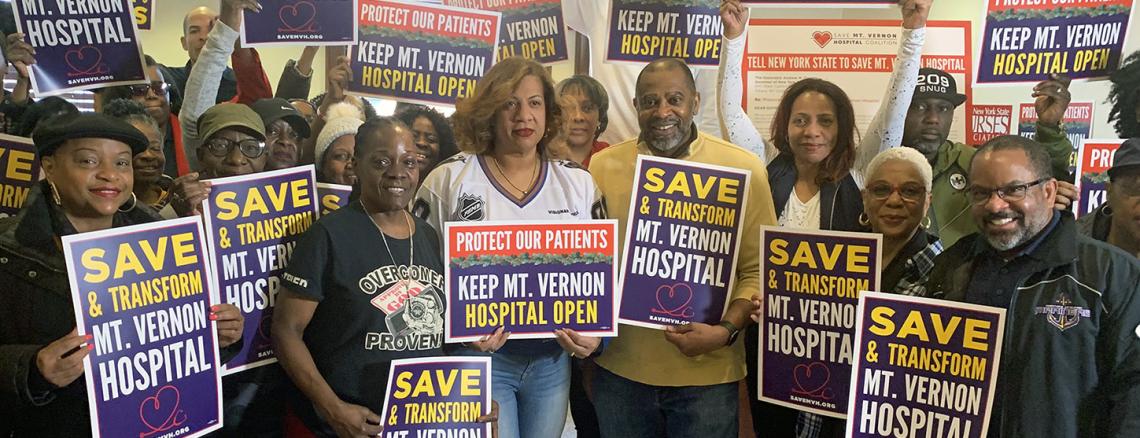Keeping Mount Vernon open for care

The vital importance of Mount Vernon Hospital to the people of that city is increasingly apparent to all involved. NYSNA nurses at the facility, many of whom live in the city, are among the leadership of a coalition of families, religious organizations, local, state and federal elected politicians who see the threatened closure as a risk to the lives of the people.
As the nurses explain, an ER without a place in the hospital to send the sickest and most injured is hardly an ER at all. Dispatching the very sick to facilities outside Mount Vernon spells disaster for some. People die as a result of such delays — “wasting precious time” in the words of NYSNA President Judy Sheridan-Gonzalez, RN.
Who exactly faces this dire prospect? Two thirds of Mount Vernon’s population is African American, with a poverty level of 15%—twice that of Westchester County as a whole. In 2018, the rate of uninsured in Mount Vernon was 65% higher than the county’s.
Insufficient ER
This explains why Mount Vernon meets the criteria of a medically underserved population. It is alarming to take note that the ratio of premature (under age 65) deaths of African Americans to whites actually worsened during the 2013-2018 cycle of the NYS Health Improvement Plan program. The official community health needs assessment of Mount Vernon’s African American population “demonstrates excess mortality rates from heart disease, stroke, and diabetes compared to County and New York State averages.” The city remains a hot spot for asthma hospitalizations (adult and pediatric), according to Montefiore Mount Vernon/New Rochelle’s Community Needs Assessment and the 2017 NYS DOH Health Equity Report on Mount Vernon. Mount Vernon was in the highest county quintile of prevalence of uncontrolled diabetes and long term complications from that disease. The facility’s psychiatric patients—70% are African American—are another critical healthcare access for the population. Almost 70% of the discharges from Mount Vernon Hospital are to Mount Vernon zip codes.
Tracy McCook, RN, has 32 years of service to patients at the hospital and works in the ER. “Every day I see patients coming into the hospital in dire need of critical care and attention,” she told the online publication, Patch. “Yesterday we were 90 percent full to the allotted capacity and the psychiatric unit was full with an overflow in the emergency room…. [W]e are understaffed and the hospital is overflowing. Montefiore Health System is endangering the lives of Mount Vernon residents by taking away this critical resource and replacing it with an insufficient free-standing ER.”
In short, Mount Vernon is the very last place where you would seek to diminish health services.
Yet that’s exactly what Montefiore is doing.
The hospital masks its move by allowing services to deteriorate, a diabolical self-fulfilling prophecy: We make conditions worse and you don’t use it. “The services have deteriorated at Mount Vernon Hospital, and when you starve the hospital, people stop using it,” said President Sheridan-Gonzalez, RN, who works in the ER at Montefiore’s Mose campus.
The closure must be seen against a backdrop of expansion for Montefiore: several years of merger and acquisition in the lower Hudson Valley healthcare network, including takeovers of White Plains Hospital and Nyack Hospital. In 2017, Montefiore showed a $32.7 million surplus on $3.7 billion in revenue.
Montefiore’s new CEO, Dr. Philip Ozuah is a multi-millionaire, thanks to the hospital system. In his prior job at the healthcare system, he earned $3.8 million in 2017, including a bonus of $856,000.
Full service hospital a must
There is some fancy financial footwork at Montefiore at the very time it pulls the rug from under vital health services in Mount Vernon. Most recent records reveal at $60 million offshore account in the Central American/Caribbean region and another $30 million offshore in financial investments. Montefiore is a tax-exempt non-profit hospital system.
Lyndon William is a county legislator representing Mount Vernon. “The health status of many of the residents demands a functioning, full service hospital,” he said. Williams points to levels of diabetes, heart disease and high blood pressure in the patient population as the basis for his concern. He remembers back in 2015, during a meeting with Montefiore when the healthcare company made promises to expand and modernize the hospital. “When did they change direction?’ he asked.